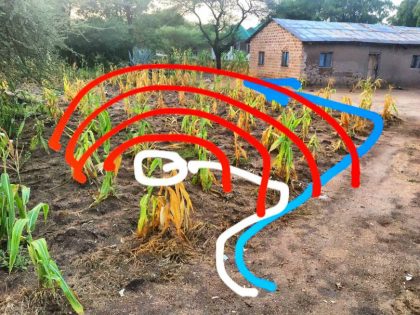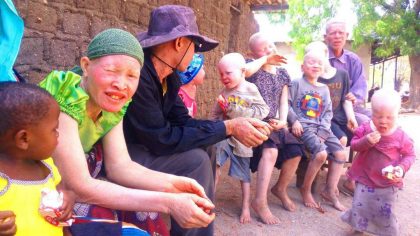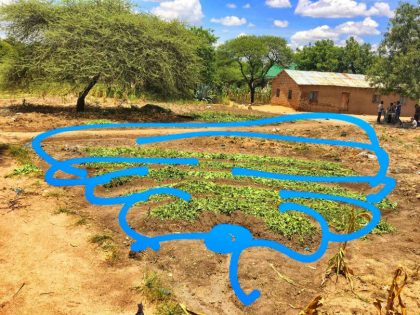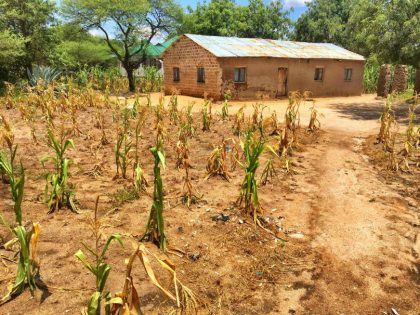These 3 weeks of training have been completed successfully! You can read the conclusion reports by clicking HERE.
The thirteenth training of our Permagarden Training Initiative – Worldwide will take place in March – April 2019. Peter Jensen will train local People with Albinism and HIV-affected individuals in Tanzania with his Terra Firma Permagardens for Empowerment and Resilience course. Here is an outline of what we intend to accomplish in this monumental initiative to spread the permaculture technology across the globe, and, in this case, specifically to some of the most impacted communities anywhere. We have already been working with these communities in water filtration, rainwater catchment, soap making and other activities. Adding the Perma garden training will help them with their fundamental need to grow their own food, and do so in a manner that doesn’t waste their most precious resource… water.
What: Permagarden Training and Outreach in Tanzania. This program includes 3 separate pieces of training, all with the goal of benefiting the 13 people with albinism communities. The HIV group we are training in these techniques will also be traveling to the Albinism Reservations to conduct further training with these groups, as the people with albinism are unable to travel safely themselves around the country (see People With Albinism Communities Training Program).
Trainer: Peter Jensen, RPCV (Haiti, 1985-87), Agroecology and Permagarden Training Specialist.
Host and Local Director: Kenedy Mahili
Where: Mwanza and Shinyanga Regions, Tanzania
When: March 15-April 7, 2019 Summary: To provide a three complete, Three Day Terra Firma Permagarden Creation and Outreach Training for 3 Friendly Water for the World groups in Mwanza and Shinyanga Region, Tanzania. Each training will target 25-30 local albino and HIV-affected individuals.
____________________
People with albinism are found throughout Africa, especially in the central and eastern regions. A lack of skin pigmentation (melanin) – a genetic condition that results in people appearing white (actually pinkish), with skin burning easily in the equatorial sun, and often with severely impaired eyesight. The physical condition would itself be difficult enough to manage – long clothes, hats, body lotions, strong eyeglasses – but worse is the social situation in which people with albinism find themselves.
They are calling people from other reservations as well so that they can teach them to implement, agricultural methodologies known as Permagarden Technique. Water used for growing food accounts for the majority of any community’s water usage. Therefore, teaching people to get more food for less water, while also replenishing their aquifers and keeping the valuable topsoil from being washed away makes a huge difference. It simultaneously addresses food & water scarcity and improves the economic situation of the farmers in the process.

People with albinism in Tanzania live in constant fear, because they are hunted, killed, and dismembered, especially by those in fishing and mining communities. Witchdoctors teach these communities to believe that possession of bones and body parts from people with albinism can lead to wealth because of which more than 100 people with albinism are killed and gruesomely mutilated in Tanzania each year. It should be noted that many are killed while walking to gather water for their households. There is also a myth that sex (i.e. rape) with a woman, boy, or girl with albinism is a cure for HIV – hence, many of those raped are infected with the disease.
Since they have no way of protecting them in their own communities, the Tanzania government has chosen to collect people with albinism in camps, where they receive very minimal aid from other community-based or non-governmental organizations.
The step by step Terra Firma Method will be used throughout to guide learners and future trainers on how to make the most suitable all-organic, water-conserving, nutrition-focused, home garden for this particular climate and culture. Terra Firma guides the learner to make the most informed agroecological-appropriate garden but can also be used intersect orally in public health, youth development, and small enterprise development situations as well. All actions within the workshop will foster independence rather than dependence upon outsiders to continue. The “TF method” uses only the tools, plants and soil amendments that are already locally accessible to targeted beneficiaries, namely rural poor farmers, mothers and children enabling further adoption within the local community following training by these soon to be trainers. Follow up within 3 months of training (by Mr. Kenedy Mahili and his staff) will be reported to show onward adoption of this simple yet empowering methodology. 60 home gardens are anticipated within this first period; benefiting 7 people per garden for an expected total of over 400 persons. A full year later this figure will be expected to be near 300, implicating an outreach to over 2000.
The training session started from Monday- with site assessment with local facilitators and determining garden venues/resources. Day 1 was to design keyhole and do carbon capturing. Day 2 was about water management and double-digging. Day 3 was to check up on soil health, doing bio-intensive management and outreach planning. Day 4 was to do a debriefing with the facilitator and local leaders for reconnection and Saturday was traveling to the next venue.
Before and After photos
Training Locations and Individuals
March 4-8 Ilemela PLWHA Group Mwanza 25
March 9-15 Mhunze Albino Group Shinyanga 20
March 16-23 Maganzo Albino Group Maganzo 20
Weekly Agenda:
Monday: Site Assessment with local facilitators; determine garden venues/resources
Tuesday: Day One. Keyhole Design and Carbon Capture (Compost)
Wednesday: Day Two. Water Mgt Design and Protection; Double Digging
Thursday: Day Three. Soil Health, Bio-Intensive Management; Outreach Planning
Friday: Day Four. Debrief with Facilitator and Local Leaders for Reconnection
Saturday: Travel to Next Venue
Sunday: Day Off

This project has been fully funded by our friends and partners in a number of projects around Africa, Friendly Water For The World
If you would like to contribute to projects like this, feel free to donate below, and the funds will be applied to starting more of these kinds of efforts. You can note which aspect of this project is most interesting for you (i.e. Permagardens, People With Albinism, People With HIV, Tanzania, etc.)

